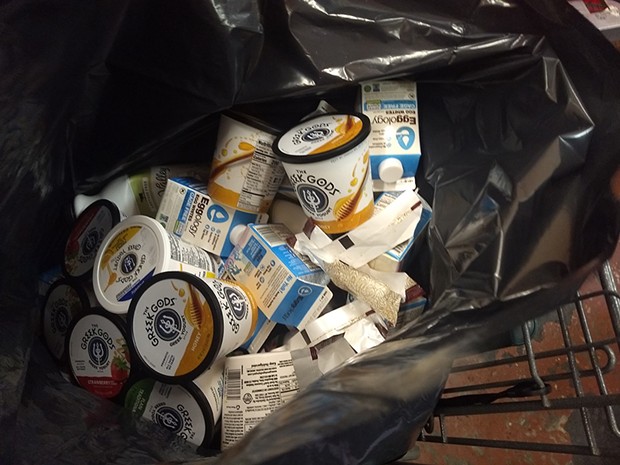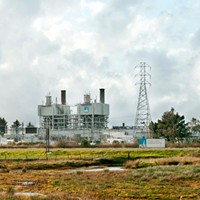Humboldt's Food Business Meltdown
Racing against food spoilage during the PG&E shutdown
By Jennifer Fumiko Cahill [email protected] @jfumikocahill
Courtesy of the North Coast Co-op
Dairy products that went above health department prescribed temperature during the power outage were thrown away at the North Coast Co-op.
[
{
"name": "Top Stories Video Pair",
"insertPoint": "7",
"component": "17087298",
"parentWrapperClass": "fdn-ads-inline-content-block",
"requiredCountToDisplay": "1"
}
]
Shortly after 2 a.m. on Oct. 10, employees at both branches of the North Coast Co-op were doing what nobody wants to do: throwing out food. Some worked 12-hour shifts through the evening, pouring out milk, throwing out cheese and tofu, hauling legs of lamb, ox tails and cartons of eggs to the Dumpsters out back. Perishables that hadn't sold in the stores' pre-blackout half-price sales and rose above health department prescribed temperatures had to go.
As word spread that Pacific Gas & Electric would be shutting down power to Humboldt County around midnight Oct. 8 for up to five days, the scramble was on for restaurants, markets and food producers to store or sell precious inventory. Whether or not they took a hit — and how hard — was part preparedness and part luck. While some made it through the 28-hour power outage relatively unscathed, other businesses took crushing blows to their stocks.
According to Public Education Officer Christine Messinger, staff from the county Department of Health and Human Services' Environmental Health division was out contacting restaurants and sharing safety information with those that were open. It also distributed its three-page handout outlining maximum temperatures and storage, reopening and disposal protocol, as well as testing food temperatures to determine what had to be destroyed.
While restaurants like the Bigfoot Steakhouse in Willow Creek have generators powerful enough to run basics like refrigeration, cooking, ventilation and lights as long as fuel holds out, that wasn't the case for most. Without alternate power, the choice before many was either to shut down, seal everything in refrigeration units with as much ice as they could rustle up and hope the power came back before everything spoiled, or to sell off as much as possible to prevent a total loss.
A number of food business owners did the former, loading cold food into freezers — some duct taping the doors — and crossing their fingers. Ferndale Meat Co. sealed its freezer and kept its own inventory and the meat it stores in lockers for customers stone cold. At the Arcata Foodworks Culinary Center, which serves some 42 food businesses (Arise Bakery, Diane's Sweet Heat, Beck's, Peace Pops, Celebrations Tamales, Renata's Creperie, Loco Fish Co. and Los Giles Taqueria among them) a kind of martial law prevailed over the industrial walk-in freezer. "We implemented a curfew (of 10 p.m.) on when someone can go in and out and I put a padlock on it," said maintenance technician John Wright. He added that the interior only went up to 12 degrees and likely could have gone another three days. But the full five days, he said, is "probably the threshold" for keeping food below 32 degrees, and he estimated the center's cooler would make it 36 hours keeping food below 41 degrees.
The co-op's effort to unload its comparatively huge inventory was a gamble that paid off, at least partly. "If we hadn't done that, I don't know how long it would have taken to get rid of all this product," said general manager Melanie Bettenhausen. Generators kept the lights and a few registers running, but the amount of power required to operate the stores, refrigeration and cooking included, averages some $30,000 per month.
Bettenhausen said normal procedure for a blackout would be to call around for refrigerated trucks in which to store the food. However, since so many counties were affected at once and most had more warning than Humboldt, few were available — drivers were even scarcer. They're not cheap, either; two refrigerated trucks from Sacramento, which would have taken hours and not held everything, would have run around $10,000 plus fees for additional days. WinCo, according to employees, managed to score 11 refrigerated trucks and stashed perishables for the duration.
On Oct. 10, Bettenhausen hoped the total wholesale loss would come to no more than $35,000. But by Oct. 14, the reality of the total product loss was more than $85,000 wholesale. It looked, she said, like insurance was going to cover the loss of inventory — just not the loss in sales, as a planned blackout doesn't qualify for coverage.
"The part that isn't really visible is the toll it takes on the people," Bettenhausen said. Once the dumping was through late on Oct. 10, the reordering and restocking was another mammoth task for "a crew of people that have just worked their asses off." (It's also expensive, given that stocking the store tallies up to around half a million dollars a week, according to Bettenhausen.)
While refrigerated trucks would have spared the co-op spoilage, the stores and its employees would still have suffered in a longer blackout. Bettenhausen said the North Coast Co-op, like many local businesses, can't afford to pay workers for days the stores are closed. She also expressed concern about staying open for the projected five days to provide shelf-stable items to the community, especially if employees themselves are in crisis without gas or power. "How many people can we actually have working in the store selling dry goods and to keep it safe?" she wondered. At one point in Arcata, she said, half a dozen people attempted to interfere with the dumping to retrieve food from the trash, decrying the waste. (Giving away the food would not only expose the market to liability if someone got sick, Bettenhausen said, but insurance wouldn't cover the donated food.) Feeling unsafe, staff called the police.
At the Tofu Shop, the power outage was devastating. "We lost everything," said owner Matthew Schmit. He opened the business in Arcata in 1980 and now employs 14 people and ships two dozen varieties of tofu products to some 120 markets, restaurants and delis, at least 80 of which are in Humboldt. Schmit estimates he lost $11,000 worth of tofu (at wholesale price) or approximately 3,000 pounds. By the time the outage was announced, he was unable to find storage options and so locked down his walk-in refrigerator and hoped for the best. "I just watched the temp slowly climb and once it got up above the safe temperature, there was nothing we could do."
On Thursday, he and a couple of employees began the arduous task of opening every package emptying and washing the containers for recycling, and filling 22 barrels with food waste, which he diverted to local ranchers whose pigs enjoyed a high-soy diet that week. "You just do what you gotta do and you move on," he said. Schmit has spoilage insurance and on Oct. 11 was waiting to hear back about coverage. "They told us that this is new territory for everybody." But there's no getting back those days of productivity and profit, and it'll be another couple days before the beans are soaked and tofu are ready to ship again.
"Last time I checked into the cost of getting a generator for the size of our walk-in, it was just more than we could afford," said Schmit. With more warning, he says he might have found alternate storage or stopped production ahead of the outage.
By Oct. 15 the Tofu Shop was shipping some of its regular orders but staff expected to still be catching up into the next week. Schmit had also heard back from his insurance company. It won't be covering the loss because the shutdown was planned.
"We're just going day by day here," said Schmit. "But I'm feeling postive because I know I'm not alone."
Jennifer Fumiko Cahill is the arts and features editor at the Journal and prefers she/her. Reach her at 442-1400, extension 320, or [email protected]. Follow her on Twitter @JFumikoCahill.
Speaking of...
-

No Peeking Behind the Nuke's Fence
Jan 20, 2022 -

Honsal Declares Local Emergency Due to Storm, Work Continues to Open 96, 299
Dec 28, 2021 -

Storm Alert: Wild Winds and Snow to the East
Nov 8, 2021 - More »
more from the author
-
Look Up for Rooftop Sushi
- Apr 19, 2024
-
Resentencing, CASA Kids and Freaky Fish
- Apr 19, 2024
-
Eco Cemeteries, Flags, Impacts and Foods
- Apr 12, 2024
- More »

































